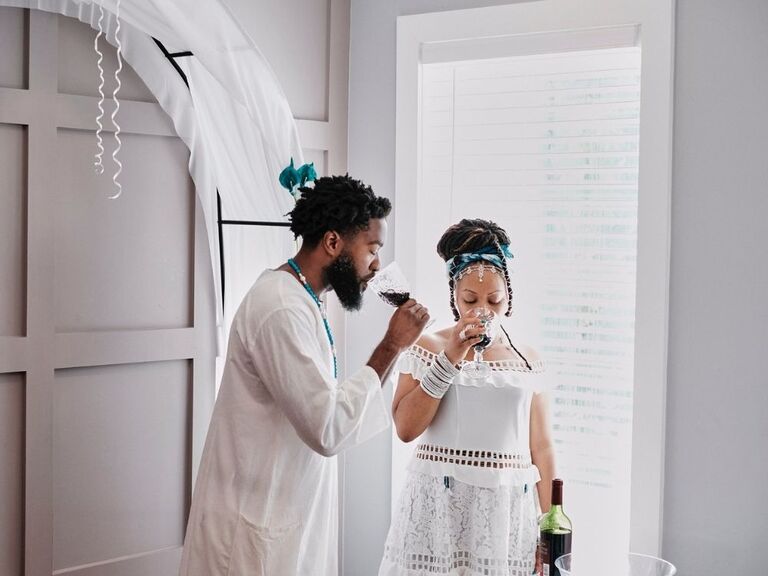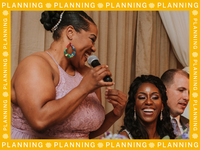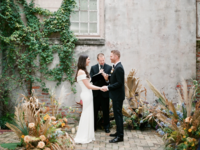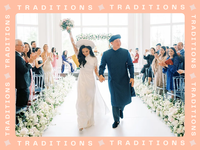Everything You Need to Know About a Wedding Libation Ceremony
We have included third party products to help you navigate and enjoy life’s biggest moments. Purchases made through links on this page may earn us a commission.In addition to wedding vows to seal the marriage contract, wedding traditions and rituals are a beautiful and meaningful element that many couples choose to include in their nuptials. For many Black and African-American couples, the libation ceremony is one such ritual that they choose to weave into their wedding ceremony.
Courtney-Rose Dantus, expert wedding planner and owner of Dantus & Co. Events, emphasizes that "the realities of the Transatlantic slave trade mean that people of African descent are a scattered people. Throughout our time in this country and others, there has been a need for putting the pieces of our dispersed families back together and focusing on the place known as our common Motherland, Africa. Additionally, Black culture and tradition places great value on those who came before; those who sacrificed and paved the way for us. In heartfelt moments (like a wedding ceremony) the memories of those who have passed on can come more clearly into focus. The libation ceremony is a way of 'inviting the ancestors' into the space and 'welcoming their blessings and protection'—especially for something as important as special as a new marriage."
Dantus goes on to note that, whether or not you include a libation ritual or a different type of ritual in your wedding day, "as couples seek to plan wedding ceremonies that are less like their parents' and grandparents' ceremony and more of their own style, we will see rituals of all kinds taking prominence. It's really about creating a day that a couple will truly feel proud of and remember for a lifetime."
What is a Libation Ceremony?
"A libation is the pouring of a liquid or a grain as a sacrifice to a deity or to ancestors to esteem, remember, and/or memorialize," explains dating and relationship coach, and founder of Match Marry Mate, Joyice Robinson Myers. "African Americans usually choose a liquid libation which can include either blessed water, wine, or liquor. Wine is understood to be the 'bridgeway' between water and liquor and is often used in libation ceremonies at weddings. The tradition is mostly symbolic as a demonstration of honor, respect, and inclusion. Libations serve as a medium to invite the Creator and those who have transitioned to bless us and to join us. We want them to know that we remember you—we have not forgotten you." Along those lines, Robinson Myers notes that "From an Afrocentric view, our ancestors are always with or still with us; so, we do not call them the departed.' Instead, we use transitioned or other similar descriptors to refer to those who have died."
Dantus goes on to elaborate that, "in its simplest form, a libation, or ritualistic pouring, is a way to call on your ancestors, or anyone dear to you who has passed on, for presence, guidance and protection. Whether the ceremony is a Kwanzaa gathering, a wedding celebration or just a gathering of loved ones, a libation ceremony is a way to 'call' the ancestors into a space. Because of its West African roots, the libation ceremony has been embraced by couples to emphasize their connection to the African diaspora and to make their ceremony more culturally relevant. Like other Black wedding rituals, such as 'jumping the broom' or 'tying the knot,' couples include a libation ceremony on their wedding day to show their connection to heritage and their connection to those who are in the room, as well as to those who have passed on to the afterlife."
"My husband and I chose to incorporate a libation ceremony at our wedding to recognize our Afro-Hebraic roots but also to esteem the Creator, remember our Ancestors, and to intentionally memorialize our deceased fathers," shares Robinson Myers. "We believe that getting married is a spiritual union between us and the Creator, a personal union between us as two individuals, and a familial union between our two families in addition to the legal contract. Had our fathers been alive, they would have been personally invited; and so, in their deaths, we extended that personal invitation to a spiritual one. We chose to pour wine because it's a 'bridgeway' and it represents both the seen and unseen worlds."
Libation Ceremony Meaning and History
"This ritualistic practice is as old as Africa herself," says Robinson Myers. "Libations have existed wherever and whenever Africans have existed and migrated—including the passage from West Africa and into the New World. Many people of African descent, wherever they are located, have carried their traditions with them and libations are no different. This ritual is important to Black couples for a variety of reasons including spiritual connection, ancestral inclusion, communal contribution, cultural identity, and personal meaning. It's important to me for these same reasons and to honor our homeland, Mother Africa, as the origin and the connector."
Libation Ceremony Details
"A libation ceremony can be very elaborate," explains Dantus. "It can incorporate African drumming, dance, languages. It can feature toasts, poetry, spoken word, and cultural call-and-response. Alternatively, it can also be as simple as having your Wedding Officiant or a single speaker lead. Some couples choose a small group of libation celebrants."
Introduction to the Ceremony
"I have participated in a number of libation ceremonies whether at a weddings or elsewhere and they each had their own different nuances," explains Robinson Myers. "However, in a wedding, the libation ceremony usually begins with a greeting and sometimes with an explanation when visitors are present. The person designated to pour holds up a cup filled with their liquid of choice (blessed water, wine, or liquor). Just before they begin their call, they will ask a designated elder (usually the most senior elder) if they have their blessing to continue."
"Once the blessing has been given, their call begins," notes Robinson Myers. "It may start with an African proverb or a familiar saying and usually includes the words, 'In the spirit of remembrance, we pour this libation.' The caller may also invoke the names of the people they seek to remember. Then, they would proceed with their toast.
Calling the Ancestors
Next in the ceremony, Dantus explains, "one by one, names of beloved ancestors are spoken out loud. Typically, they are ancestors of both marriers. Sometimes, if guests are asked to join in, they might one by one, call out the names of ancestors from their own family. Sometimes, names are called of historical figures who are not related to either of the marriers or their guests."
Robinson Myers goes on the emphasize that "there is no standard template for this toast. Each couple can and should make it their own. But it usually gives some honor to the Creator, family, friends, children (real or imagined), and the ancestors of the couple. It is common for the libation caller to conclude with: Therefore, we cast our libation to the North, to the South, to the East and to the West, as well as a salutation and Asѐ. (There can be other closings to prayer proclaimed here such as 'Amen' or 'Selah.') Also, not all libation castings begin in the direction of the North—but all four cardinal directions are named in order from the first one called. For example, in our custom, we pray to facing the East; so, we poured our libations from East, South, West, and North. In our libation ceremony, I was the caller and I concluded with: Our ancestors existed so therefore we are."
Pouring the Liquid
Next, it's time to actually pour the libation—at this point the pouring of water, grain or alcoholic beverages takes place. "As the ancestor's names are called, a bit of water (or wine or whatever, depending on preference) is poured out into the ground, or into a plant or even into another container," says Dantus. "With the pouring of water or refreshment and the calling of their names, ancestors are welcomed into the space. In some elaborate variations on the libation theme, places of honor—decorated chairs and tables—might be set aside for them. Often the calling of each name is followed by a phase of affirmation that is spoken by all the guests. The Yoruban word 'asѐ' or 'ashe' is commonly used because it translates as 'so be it' or 'so shall it be.'"
"With these elements—refreshment, naming, affirmation—the ancestors (a deceased grandmother, grandfather, aunt, uncle, or even a famous historical figure relevant to the couple) are thought to be assembled and the wedding ceremony can continue," says Dantus.
Libation Ceremony Script
Since each couple should personalize their own verbiage for the libation ceremony, as Robinson Myers noted previously, there isn't a script that can be followed verbatim. However, the book The Nubian Wedding Book: Words and Rituals to Celebrate and Plan an African-American Wedding, by Ingrid Sturgis, sets forth the following script as a template couples can adapt as they see fit for a libation ceremony.
"An African proverb tells us that people who lack the knowledge of their past are like a tree without roots. So, in the spirit of remembrance, we pour this libation. We pour to honor the past, so that we may learn from it. We pour to honor the importance of family. We raise our cup to God to show our reverence for the original source of our lives. We use cool, fresh water to freshen the road our ancestors travel to be here with us today. We use cool water as a symbol of the continuity of life, to purify and to nourish our souls. We pour libation to celebrate the coming together of the families of these two people."
"It is said that through others, we are somebody. Through this marriage, we broaden our family circle, remember our heritage and recall those who gave us life. We call upon our ancestors—our mothers, grandmothers and great grandmothers, our fathers, grandfathers and our great grandfathers, uncles, aunts and cousins—the foundations of our families, immortalized in our thoughts."
"We call upon our elders, whose wisdom we seek in all endeavors. Our friends whom we are blessed to have in our lives, our parents who guided us along the road to adulthood. We call upon family who have passed over and could not be here today. We ask that they be with us in our thoughts. We call upon the bride and groom, that they may always find prosperity in love and devotion. We ask that this couple be blessed by children, because children give glory to a home."
"Therefore we cast our libations to the North, to the South, to the East and to the West. [Libation toast giver turns in the indicated directions while reading.] We wish everyone to leave more blessed than when they came. Amen."
Libation Ceremony Dos and Don'ts
As with many wedding rituals and observances that are steeped in tradition or originated in ancient times, it's important to honor the etiquette and pay attribution to the protocols associated with a given custom if you're choosing to include it in the wedding day. When it comes to a libation ceremony, our experts note that there are some things it's important to include, and others that should definitely be avoided.
Things to Include in a Libation Ceremony
Dantus emphasizes the importance of couples doing "your research on the libation ceremony and similar ones. Do compose the ritual (and your entire wedding ceremony) in a way that is authentic to you as a couple. To be the most authentically West African, remember the permission of an elder person in the room is asked before the ceremony and rituals begin. This is an appropriate way to honor treasured elders like grandparents or great-grandparents. Remember that though libation ceremonies have taken on a heightened presence in Black culture, such practices are inclusive. Libation ceremonies are practiced in many cultures–and can be celebrated, as well, across the cultural landscape and the globe."
Robinson Myers goes on to note that it is important to esteem divinities, include your ancestors and ancestral spirits and bless the liquid or grain of your choosing. She encourages all to-be-weds to also ask for the blessing of the elders, acknowledge family members and friends and connect your ceremony with your native land.
Things to Avoid in a Libation Ceremony
Conversely, Robinson Myers notes that couples should avoid planning their ceremony without intention or spiritual insight. Couples also shouldn't try to host the libation ceremony on their own—it's a community affair.





















